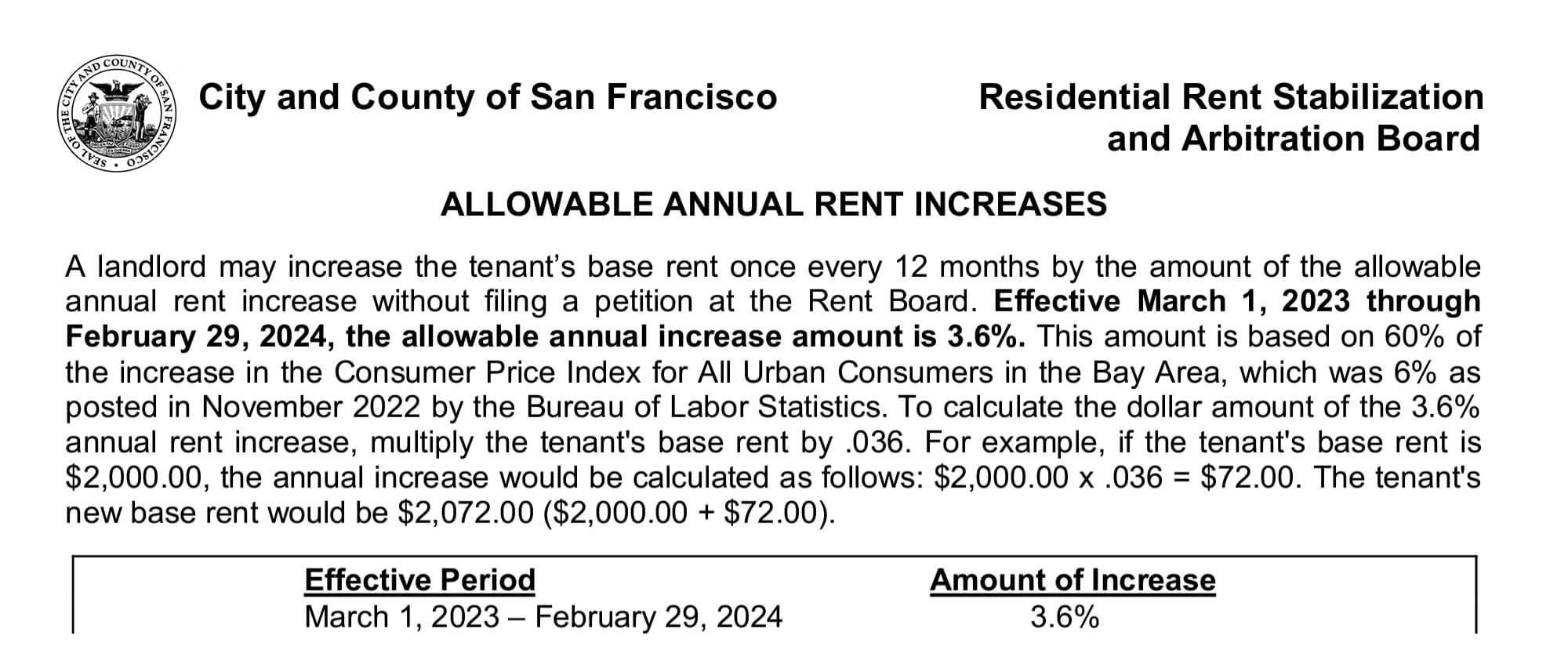Allowable rent increases in 2024 are uninspiring

A staggering 1.7%. That’s the amount San Francisco housing providers can raise rents in rent-controlled units subject to rent control.
It’s that time of year again to talk turkey in San Francisco. On November 17, the Rent Board officially announced on its website this number based on 60% of the increase in the Consumer Price Index for All Urban Consumers in the Bay Area. In November of 2022, the Bureau of Labor Statistics set this index at 2.8%.

The allowable increase is easily calculated by taking the tenant’s base rent and multiplying it by .017. An easy example: Base rent is $2,000 x .017 = $34.00 increase, bringing the new base rate to $2,034.00.
What’s the cost of getting a plumber out to your rental unit nowadays?
We have long bemoaned the fact that the costs of operating a rental business have outpaced the cost of consumer staples. Not adequately reflected in the Consumer Price Index (CPI) is the sticker shock that comes with buying materials, disposing of waste, keeping the lights on, and paying contractors to effectuate necessary repairs to keep the unit in habitable condition.
For rent increases effective March 1, 2023, through February 2024, the numbers are a bit more favorable with a 3.6% Annual Increase.

To put this into perspective, this 3.6% allowable hike in rents was the largest in nearly three decades, rivaled by a 7% allowable increase in 1983 and a 4% increase in 1992 and 1993. Only marginal rent increases were to follow in the coming years.
For the cerebral types: Get a historical timeline of SF rent increases →
Other locales have tampered with their ordinances amid inflation.
When policymakers witnessed the kind of inflation numbers we haven’t seen since watching Dallas and The Jeffersons on television, there was soul-searching on who should bear the brunt and predictably, it would be housing providers.
Oakland decided to limit its permissible annual rent increase to 60% of the rise in consumer prices, or 3%, whichever amount is less, and Richmond followed suit by being stuck at 3%.
Berkeley came up with a close number and wasn't that much more generous, with rent ceilings for most units subject to a 2024 Annual General Adjustment of 1.9%, taking into account 65% of the CPI from July 1 through June 30 of the prior year.
Whenever a rent increase is contemplated, questions abound
![]()
-
First and foremost, what law is the property subject to? More restrictive local rules, the state law of AB-1482, or is there an exemption that allows landlords to raise the rent to whatever their heart desires?
-
What, exactly is the base rent for the unit and the anniversary date?
-
If an increase is missed, can it be “banked,” whereby the increase can be imposed at the next anniversary date?
-
Can storage, parking, and other fees for amenities be increased?
-
What are the notice requirements and how to properly serve them?
-
Is there any Notice of Violations surrounding the property or tenants complaining of habitability issues that would impair the landlord’s ability to raise rents?
-
Are there any anti-price gouging laws in effect triggered by a natural disaster?
-
Must housing providers engage in a formal mediation process when certain increases are proposed?
-
Can the rent increase be argued as being retaliatory or designed to displace the tenant?
-
Has the landlord complied with rent registry requirements, giving them a “license” to raise rents?
-
Can a single-family home lose its status as being exempt from rent control because there are multiple units and essentially has become a boarding house?
These considerations and others should be top of mind whenever housing providers are eyeing a rent increase. This should be a deliberate process approached with proper counsel given the unique circumstances.
Whenever there is an improper rent increase, the additional income can be disgorged later on and worse yet, invite a lawsuit.
Contact Bornstein Law to get it right.
